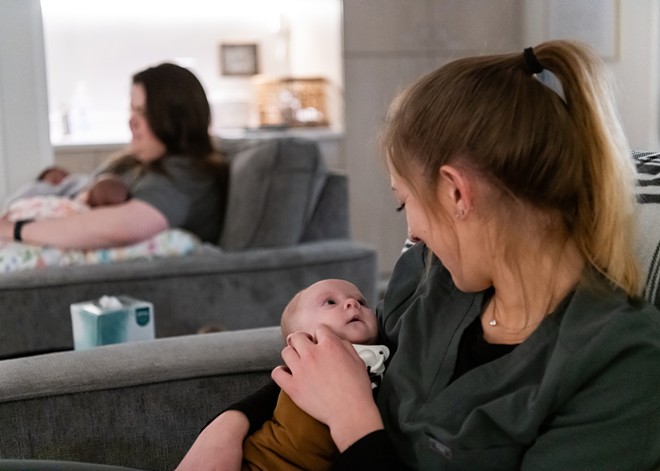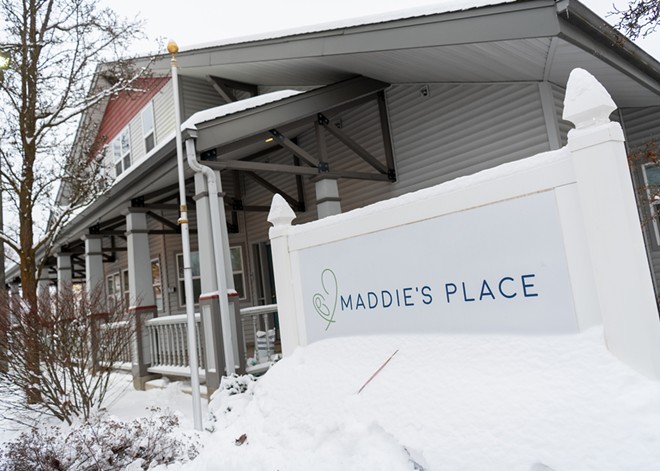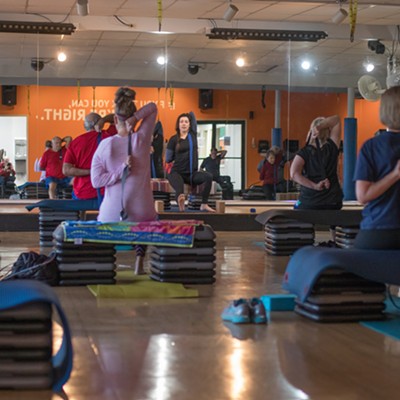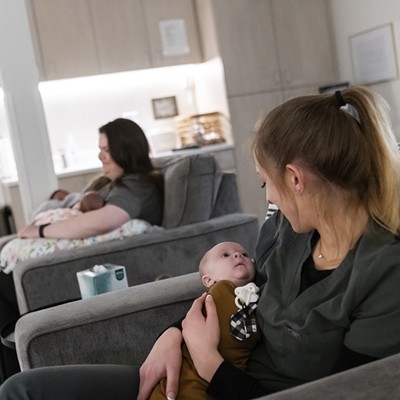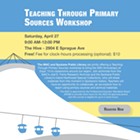Late Thursday afternoon last week, the scene inside one of the nurseries at Maddie's Place in the Perry District was delightfully peaceful.
With the lights dimmed in the living-room style space, two infant care specialists sat in cushy chairs holding three tiny sleeping babies against their bodies — one was born at just 2 pounds, but has managed to double his weight. Two more infants slept silently on pillows on the rug in front of the staff, swaddled in the comforting embrace of tightly wrapped blankets.
But that's not always what it's like for the infants here, who were born addicted to drugs and suffer from what's known as neonatal abstinence syndrome, or NAS.
Many of them cry for hours on end in a high-pitched tone, thrashing their bodies as they struggle with withdrawal and recovery for weeks or months. Some sleep nearly constantly, while others are hyperactive and shake, especially when overstimulated by light or noise. Some won't eat when they're hungry or struggle to make eye contact, missing early milestones essential to development.
Each was exposed in utero to drugs ranging from methamphetamine to legal antidepressants, but the vast majority — more than 80% — of the 64 babies who've received care at Maddie's Place have been addicted to opioids, most often fentanyl.
Opened in October 2022, Maddie's Place uniquely allows a parent (the mother or father, but not both) to live at the facility with free room and board while their infant is taken care of and assessed by medical staff.
By working with mostly mothers, the nonprofit has simultaneously helped parents get into recovery, attend court dates, work with child protective services, get to medical appointments, and more. Virtually all of the parents who've had a child receive care at the nonprofit were homeless when their child was born, so the staff also helps them secure housing before discharge.
The results are game changing: All 30 women and two men who've lived at Maddie's Place with their infant have retained custody, and nearly all of the babies have been able to recover without the use of morphine. The two infants who received morphine only needed one or two doses.
"The mom, if she's in recovery, is the best medicine for the baby, and the baby is the best medicine for the mom," says Shaun Cross, Maddie's Place president and CEO. "All of the women who have gone through this program are in custody today of their babies."
With a focus on holding the tightly swaddled babies as much as they need, and a staff of 79 working three shifts to provide 24/7 care, Maddie's Place has been able to improve outcomes for babies for a fraction of the cost of hospitalization, Cross says.
"This is disruptive," he says. "And way better."
But there's a snag to getting that care paid for.
With help from Republican U.S. Rep. Cathy McMorris Rodgers, federal law changed in 2018 to allow Medicaid (the government-funded insurance for very low income people) to cover stays at pediatric transitional care facilities. But Washington state law hasn't changed to include that coverage. Washington pays half the cost of Medicaid for its residents (federal money covers the other half), so without the guarantee of state reimbursement, some insurance companies that provide Medicaid might not approve a stay at Maddie's Place, Cross says.
However, with help from local lawmakers, the nonprofit has been given a shot to prove they're worth it, with the state paying for most of their operations under a two-year pilot program, and a study underway to analyze the outcomes.
STUDYING OUTCOMES
Washington created a license for pediatric transitional care facilities in 2017, but aside from a similar Kent facility that was grandfathered in, Maddie's Place is the first facility to open under those new state guidelines.
There are only three other facilities in the country using the same model as Maddie's Place, Cross says. Those three are in Arizona, Ohio and West Virginia. All have opened in the last decade or so, largely in response to the opioid epidemic.
Last year, state Rep. Marcus Riccelli, D-Spokane, helped secure $5.5 million of the state's opioid settlement account for Maddie's Place to serve as a pilot program from July 2023 to July 2025, Cross says.
"The pilot program must study and evaluate the efficacy, outcomes, and impact of providing these services to avoid more costly medical interventions," according to the state budget item.
The funding includes $190,000 for Washington State University to conduct a study of Maddie's Place this year.
The study has three aims, explains Celestina Barbosa-Leiker, the lead researcher on the team and executive vice chancellor for WSU's Health Sciences campus in Spokane.
First, what is the actual rate of neonatal abstinence syndrome in Spokane County, and what are the barriers to getting accurate and up-to-date statistics?
Based on nationally estimated rates, providers would expect about 36 babies in our area to be born with NAS each year. But in about 15 months, Maddie's Place has already treated 63 infants (admitting their 64th on Monday) and received inquiries for another 63.
Part of the information gap may be due to doctors listing the syndrome on the mom's chart instead of the baby's, but the team will be talking to neonatologists, OB-GYNs and pediatricians to better understand what's going on, Barbosa-Leiker says.
"We're trying to find all the leaks in the pipeline where the information is falling out," she says.
The second aim of the study is to look at the outcomes for the moms and babies who've stayed at Maddie's Place, including observing the developmental milestones the babies reach, and looking at the behavioral health of the moms.
The third aim is to highlight the stories and experiences of the moms, with the team interviewing the mothers about their stay and trying to learn what they would've done without that help.
"We're really thrilled about this evaluation, because I think we're going to be able to show exactly what Maddie's Place is really able to do," Barbosa-Leiker says. "I think they could be a national model of care for babies with neonatal abstinence syndrome."
The study will be provided to the Washington State Health Care Authority, which will provide a report to the Legislature by December. That report could impact whether state lawmakers approve the care to be covered by Medicaid.
"If we can get $1,000 a day, which is what I'm shooting for, it'll be a quarter [the cost] of what the current model is, with way better outcomes," Cross says.
BREAKING DOWN BARRIERS
Maddie's Place was founded by Tricia Hughes, a local nurse who for years took in babies with neonatal abstinence syndrome to help them recover. Through trial and error, she learned what worked and what didn't, and she found the most success when she spent nearly every hour of the day carrying the infants wrapped closely to her body.
In 2008, she had her first experience caring for an infant born addicted to opioids — Maddie.
Hughes and her husband adopted Maddie and four other infants born with NAS, but eventually, her husband told her they couldn't possibly save every child.
Instead, Hughes could teach others to provide that care.
She and Cross partnered in 2017 and set to work fundraising, then buying and renovating a facility to meet strict state standards (with the added challenges of the pandemic). In fall 2022, they opened the doors.
They've already started to prove that infants can have better outcomes, with very little need for medication during treatment, Cross says. The average length of stay at Maddie's Place has been 53 days, with some infants staying as short as a week, and one staying for 110 days.
Hughes now serves as the clinical director, while Dr. Randi Edwards is the medical director. They help oversee a team of 79 paid staff and 40 volunteers, including 27 nurses, a nurse manager, 40 trained infant care specialists, a full-time social worker, and two peer support staff with lived experience who can help moms get into and stay in recovery.
One of those peer support members is Katie Bunch-Smith, who says three of her four children were born addicted to substances. She just celebrated seven years clean and sober, but says she understands the struggles after using intravenously, shoplifting, and experiencing homelessness.
"I am lucky enough to get to work here and come alongside the moms who have similar life experience," Bunch-Smith says. "I can come to them and just be like, 'Hey, this is my story,' and immediately they can relax a little bit."
Many moms fear having their children removed to foster care by the state, and fear judgment in medical settings. Maddie's Place staff and volunteers strive to provide a judgment-free environment while helping the women recover, even though they're technically not the ones being treated at the facility.
Cross says it's important to know that it's not like any of the mothers woke up one day and decided to become homeless, get addicted to drugs and have a child in that environment.
"The birth of a child is such an inflection point," Cross says. "These women are really in a horrific predicament with very little support. There's a lot of well-intentioned stuff going on in the medical community, and a lot of great nonprofits and people are trying to do stuff. But it's siloed. It's not coordinated."
Maddie's Place is seeking to change that.
For Mary Potter, one of the moms currently residing at Maddie's Place with her son, the organization has been incredibly helpful.
Potter says she was homeless for seven years and addicted to meth and fentanyl. She says she got onto methadone 10 months ago, and her son was born addicted to that drug, which is meant to help people recover from opioid use. She was living in Moses Lake, but her son had to be admitted to the neonatal ICU at Providence Sacred Heart Children's Hospital, which is where she learned about Maddie's Place.
In the few months they've been living at Maddie's Place, Potter says she's also been able to get help with her own medical care, including getting dentures last week, since her teeth were destroyed by drug use.
"It's been awesome staying here because they've helped with a lot of things," she says. "They're helping me figure out what my next steps are, like to get a house or a place somewhere. I won't be leaving here until I have somewhere to go, you know?"
Infant care specialist Baylie Lysek says it's great to see the ongoing relationships that form with the families, noting that one mom who stayed there last year returned last week for a CPR class and brought along her 18-month-old daughter, who "was running around so cute."
"It's amazing how lives have been transformed here, both the babies and the moms. It's really incredible to be a part of," Lysek says. "We really get that long-term relationship in the community and support for moms, and it's awesome." ♦

